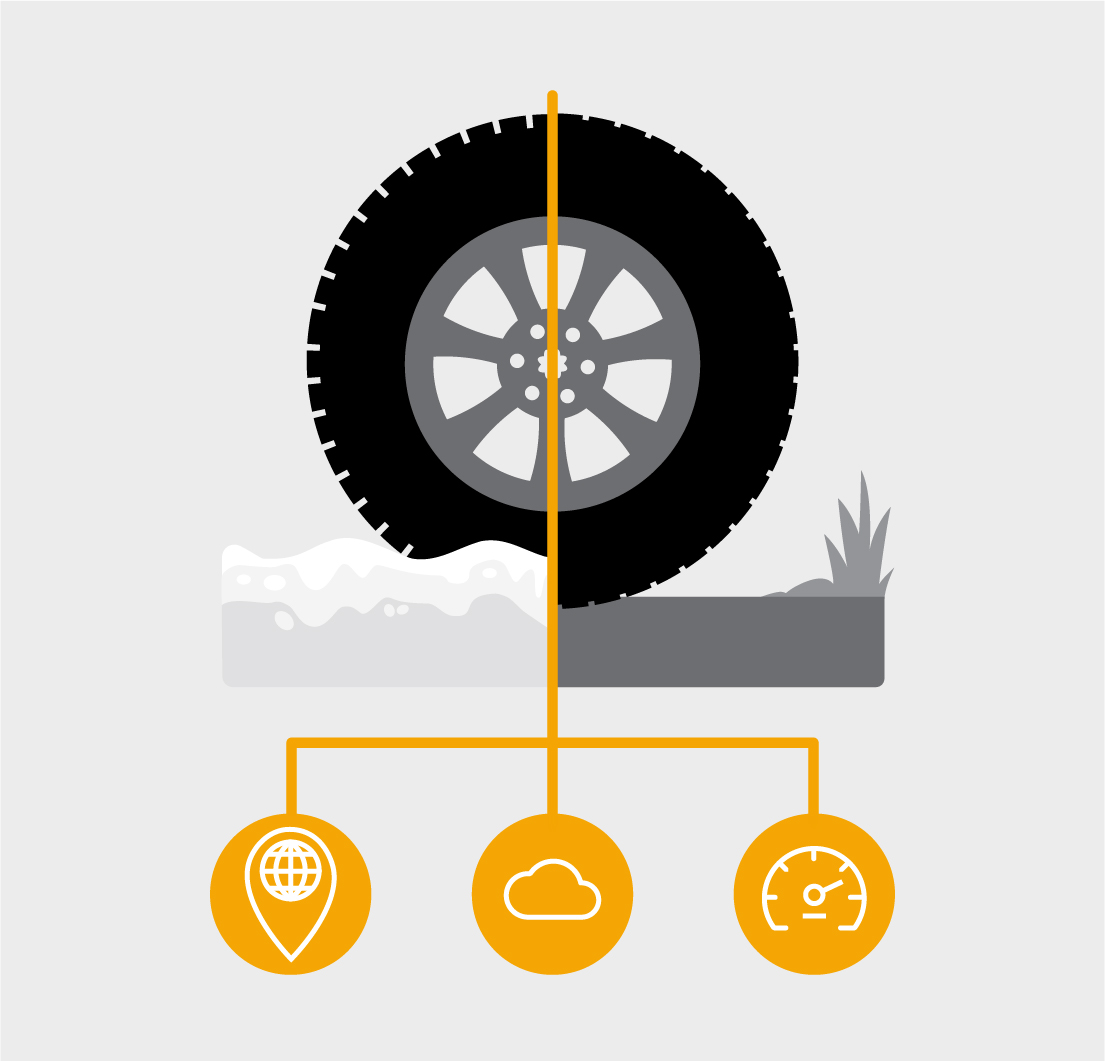
Visit Continental Tires in your country for local vehicle fitment
#WinterWorld
Winter tires vs. all-season tires
Selecting winter or all-season tires for your vehicle
Whether you need winter or all-season tires depends on many factors, including:
- Where you live
- Your local weather conditions
- How low the seasonal temperature drops

A common question tire professionals often get asked is “Do I need winter or all-season tires?” Unfortunately, there is no one-size-fits-all answer because there are many variables to consider, such as your local legal requirements, your local climate, how often you drive and your budget. In general, all-season tires also offer high levels of safety and performance in moderate climates, but let’s take a closer look at tire considerations that will help you decide.
What are winter tires?
Winter tires, also known as snow tires, are specially designed tires engineered specifically to handle harsh winter conditions, including snow, ice and freezing temperatures.
- Rubber compound: Designed to remain flexible in cold temperatures, providing better traction on snow and ice.
- Tread design: Winter tires feature deeper grooves and more biting edges to enhance grip and traction on snowy and icy roads.
What are all-season tires?
All-season tires are versatile tires designed to perform well throughout the year under moderate weather conditions, including light snow, rain, and dry roads.
- Rubber compound: Designed to perform adequately in a variety of conditions, but can become hard and less effective in very cold temperatures.
- Tread design: All-season tires offer a balance for a mix of dry, wet, and light winter conditions, but are not optimized for heavy snow or ice.
- Versatility: The tires can be used year-round, eliminating the need for seasonal tire changes. They are optimized for versatility across multiple road conditions rather than extreme specialization.
What are the differences between winter tires and all-season tires?
| FACT | Winter tires | All-season tires |
| Performance | Offer superior grip and handling on snow and ice, significantly shortening braking distances and enhancing vehicle stability in harsh winter conditions | Provide a balanced performance across a wide range of conditions, but have a noticeably reduced capability and traction in heavy snow, ice, or very cold temperatures |
| Safety | Maximize driver safety by reducing the risk of skidding, sliding, or loss of control during extreme winter weather conditions | Offer moderate safety in mild winter conditions, but may compromise safety when faced with heavy snow, icy roads, or freezing temperatures |
| Price | Typically require a higher initial investment due to seasonal purchase costs, plus additional expenses for installation, storage, and seasonal tire changes; with high yearly mileage (>20k / year) the investment is worth it | More cost-effective overall, as they eliminate the need for seasonal tire swaps and storage, making them a budget-friendly choice for moderate climates; but on average, all-weather tires achieve a mileage of around 35,000 km à for a yearly mileage of under 10k, all-season tires are the smart choice |
| Longevity | Tend to wear more rapidly in warm or dry conditions – they should only be used seasonally to maintain optimal lifespan and performance | Have a longer lifespan in general, thanks to their versatile compound and tread pattern designed for continuous year-round use under varied driving conditions |
Winter tire regulations: Know your local tire laws
Most European countries have their own regulations when it comes to winter tires (aka snow tires). For some countries, winter tires are recommended, for others they are required by law. The first step to finding the type of tire you need is finding out whether winter tires are a legal requirement. If you do live in a region where winter tires are compulsory, you could face severe penalties if you don’t have them. In that case, choosing winter tires will be an easy decision.
Continental’s all-season tires proudly display the 3PMS symbol on the sidewall, indicating that they are suitable for driving in winter and compliant with tire laws in most countries. This means you won’t have to swap out your all-season tires in the winter months. However, it pays to double-check specific requirements for where you live or plan to travel. Consult your local winter tire laws to avoid fines and ensure safety.

Should I choose winter tires or all-season tires?
If you only use your car occasionally – perhaps for short shopping trips, going to work and visiting friends and family in urban locations – swapping tires twice a year may not be worth the cost, time and effort. Tires for all-season conditions could be an alternative. However, if you use your car often – especially for trips away, into remote locations or colder regions – swapping to snow tires is usually the safer option.
Still undecided? Find out more about the differences between winter and all-season tires below.
When do you need winter tires?
You should swap from summer to winter tires when the temperatures are regularly low. Winter tires are made of a custom rubber compound that stays soft and flexible in low temperatures for better traction and handling. They provide enhanced braking performance in snowy and icy conditions and feature an aggressive tread pattern for greater traction. Learn more about why tread depth in winter tires matters. Additionally, Continental winter tires are put through additional tests to ensure optimum performance in cold weather conditions.
If you drive more than 25,000 km (approx. 15,534 miles) per year, you should also use seasonal tires to get the best performance in each season.
Learn more about the key differences between summer and winter tires.

When do you need all-season tires?
All-season tires are developed to perform all year round in moderate climates. Continental all-season tires are designed to offer impressive grip on both summer and winter roads and good braking performance on dry and wet roads. The main advantages of all-season tires are the savings – money, time, and the effort of seasonal tire changes. However, always remember that winter tires are specifically tailored to the conditions in places that experience cold winters and seasonal conditions like snow and ice, which all-season tires were not designed for.
You can fit all-season tires at any time because they are developed to perform all year round in moderate climates. Continental all-season tires are designed to offer impressive grip in both summer and winter conditions with good braking performance on dry and wet roads, as well as slush. They offer superb mileage and driving efficiency.
If you live in a moderate climate and never have to encounter severe winter or extreme summer conditions, owning all-season tires is a great choice because they offer superb year-round performance and greater convenience for the motorist.
Checking tire tread for ideal tire grip
Your tires form an essential bond between your vehicle and the road. This is what makes the tread of your all-season tires so incredibly important. The tread grips the road as you drive. So, if it’s not deep enough, your vehicle will lose traction and suffer extended braking times. Shallow tread grooves make it more difficult to control the vehicle in wet weather conditions and increase the chances of aquaplaning.
Tire tread is also important for your winter tires because they have deeper grooves to increase safety in winter conditions.
For safety reasons, Continental strongly recommends checking tread depth once a month. To do this, refer to the tread wear indicators hidden between the grooves on your tires or use a tread-depth gauge.

The tire verdict
When deciding whether you need a tire for winter or all-season conditions, keep these two key considerations in mind:
- All-season tires can be used all year round and work well in mild winter conditions, but do not have the same winter-specific features as winter tires, so their performance in harsh winter weather is not as good.
- Winter tires should not be used in summer, but they are perfectly suited to dealing with the specific challenges of winter driving.
Related content
-
 2024/09/20The weather changes throughout the year, which affects driving conditions on the road; fit your car with tires that will provide you with the most confidence.Summer tires vs. winter tiresRead more
2024/09/20The weather changes throughout the year, which affects driving conditions on the road; fit your car with tires that will provide you with the most confidence.Summer tires vs. winter tiresRead more -
 2024/10/30Learn when you need to switch to winter tires and whether they're compulsory in your region.Winter tire lawsRead more
2024/10/30Learn when you need to switch to winter tires and whether they're compulsory in your region.Winter tire lawsRead more -
 2024/10/17Ensure you have the right supplies for the season ahead with our winter car kit checklist.Prepare your car for winterRead more
2024/10/17Ensure you have the right supplies for the season ahead with our winter car kit checklist.Prepare your car for winterRead more